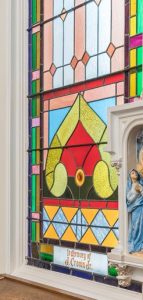In the post “real people not just names”, I considered matters such as the education, diet, clothing and entertainment of my ancestors. I need to go further.
I am also interested in what they believed. Not just about religion. Did they think that the earth was flat? Did they hold with folk tales about the weather. (e.g. If it rains on St. Swithin’s Day etc.) Were they superstitious? Did they have serious expectations that their future would be better than their present?
 And what of their faith? I learnt recently that Jeremiah and Susan (Kelley) Cronin were instrumental in the building of St. Mary of the Immaculate Conception Catholic Church in Marshall, Michigan. They donated a 10 foot by 30 inch stained glass window inside the church. The family continued to support the church down through the generations. I believe that the stained-glass window in the picture is in memory of Jeremiah Junior, son of Jeremiah and Susan. Their Granddaughter was a devoted attendee throughout her life. She often wore a striking brocade jacket in shades of yellow, orange, and gold to church. (I am grateful to a local correspondent for this particular detail.)
And what of their faith? I learnt recently that Jeremiah and Susan (Kelley) Cronin were instrumental in the building of St. Mary of the Immaculate Conception Catholic Church in Marshall, Michigan. They donated a 10 foot by 30 inch stained glass window inside the church. The family continued to support the church down through the generations. I believe that the stained-glass window in the picture is in memory of Jeremiah Junior, son of Jeremiah and Susan. Their Granddaughter was a devoted attendee throughout her life. She often wore a striking brocade jacket in shades of yellow, orange, and gold to church. (I am grateful to a local correspondent for this particular detail.)
The story is completely different for the family members that headed south. Almost all of the distant cousins that moved to Missouri were, and still are, lifelong members of their local Baptist churches. For example, Sue Waggoner (1896-1986), the daughter of John McHugh (a nephew of Susan Cronin), was a member of Elsberry Baptist Church. That is a big leap. I would love to know how the transition was made. The most likely explanation is that there were no Roman Catholic churches nearby. Even today, rural Missouri has relatively few Catholic Churches. How did they feel about the change? The rituals are different: there are no confessional boxes in a Baptist Church. The terminology is different: there is a minister not a priest. It is a communion service not a mass. The language is different. Protestant Churches use the local language. This explains why settlers in America sometimes established churches speaking their native languages. Pronunciation of Latin may vary from country to country, but it will still be familiar to the faithful.
